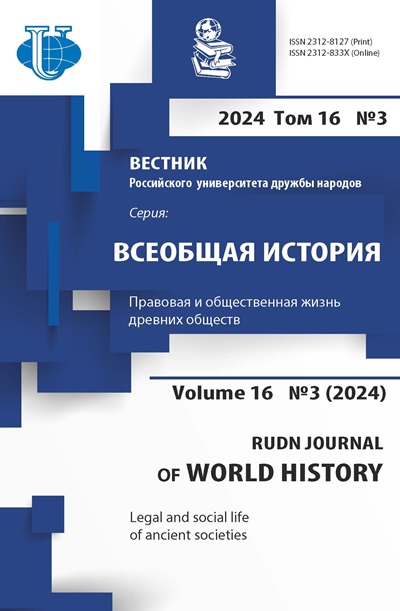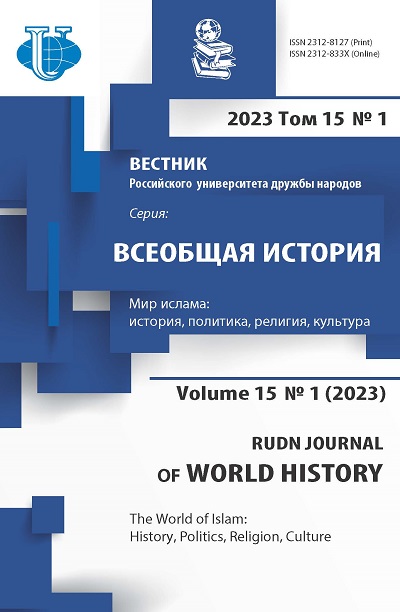Vol 15, No 1 (2023): The World of Islam: History, Politics, Religion, Culture
- Year: 2023
- Articles: 7
- URL: https://journals.rudn.ru/world-history/issue/view/1629
- DOI: https://doi.org/10.22363/2312-8127-2023-15-1
Full Issue
Religion and Politics in the Middle East
High Hopes, Lost Illusions: General Islamic Congress in Jerusalem (1931)
Abstract
The significance of the research topic is due to the relevance of the problem of the caliphate in the social and political life of the modern Arab-Muslim world. The purpose of this research project is to analyze the causes and consequences of the emergence of caliphate movements, which were the reaction of the Muslim world to the destruction of the Ottoman Empire and the liquidation of the institution of the caliphate in 1924 by the republican leadership of Turkey. At the same time, the authors focus on the General Islamic Congress in Jerusalem (1931) as a concrete example of the socio-political discussions of Muslims about the unity of the Ummah and the future fate of the caliphate. Based on the materials of historical sources, the authors identified contradictions in the diversity of ideological and value views of the caliphatists in the main areas of Islamic world - in the Middle East, North Africa and South Asia, analyzed methodological, spiritual and political obstacles that stood in the way of the ideologists of caliphatism by the example of contradictions in the activities of the Mufti of Jerusalem Amin al-Husseini (c. 1895-1974), who advocated the independent statehood of Arab Palestine, and the leader of Indian Muslims Shaukat Ali (1873-1938), who advocated the internationalization of the cause of the revival of the caliphate. The authors prove that “Islamic internationalism” in the 1930s began to acquire more and more national, ethno-culturally conditioned forms, which was due to the distrust of caliphatism on the part of the British colonial officials and the political elites of Turkey and Egypt in the geopolitical conditions that changed after the First World War. In addition, the importance of studying higher Muslim education for the characterization of the political, value, religious and philosophical positions of the caliphists and their opponents is revealed.
 7-21
7-21


Vassal Mamluk rulers of Egypt and Syria in the service of the Ottomans
Abstract
The fall of the Mamluk Sultanate under the onslaught of the Ottoman invasion in 1516-1517 turned the entire course of events both in Egypt and throughout the Muslim world. However, the establishment of direct Turkish rule on the territory of the former Mamluk possessions was preceded by a short transitional period of vassalage. The Ottoman Sultan Selim I Yavuz (1512-1520) appointed in Egypt and Syria two devoted to him Mamluk emirs Khair-bek and Janbirdi al-Ghazali, whose actions infl the further strengthening of the power of the Turks in the Middle Eastern provinces. The main purpose of the study is to identify the reasons for such an abrupt change in the policy of the Ottomans in Egypt and Syria. The author examines in detail the period of rule of the vassal Mamluk emirs and tries to determine how their actions infl the decision of the High Porte to appoint their own governors and remove the Mamluks from power. Using the historical and genealogical method, the author begins with a description of the events of the Ottoman-Mamluk war of 1516-1517. During the confl both emirs showed far-sightedness and went over to the side of the Ottomans. Therefore, they earned the special favor of Sultan Selim. However, later, while in power, both Khair-bek and Janbirdi al-Ghazali showed a tendency to arbitrariness, which served as an alarm signal for the Ottomans. Moreover, after the death of Selim, Janbirdi openly opposed the Ottomans. The result of the reign of both commanders, therefore, was an even greater strengthening of the Turks and the further weakening of the Mamluks in the Islamic world.
 22-44
22-44


Modern World
Representation of Iranian Cybersecurity Policy in the National Media
Abstract
The relevance of the research topic is due to the increased attention to the problems of cybersecurity in the modern world. The purpose of the study is to identify the position of the Iranian authorities on the issue of cybersecurity. The main method of research is the analysis of the content of the Iranian online versions of newspapers, news websites and news agencies publishing information on this topic in Persian and English. As a result of the conducted research, the main conclusion is made that the majority of Iranian information publications focus on the positive aspects of cybersecurity policy aimed at protection against foreign interference in Iran’s internal affairs. At the same time, the study revealed a number of publications that highlight not only the advantages of the Iranian government’s cybersecurity policy, but also shortcomings and gaps.
 45-55
45-55


The rise of Qatar in the international arena: causes, factors, consequences
Abstract
The relevance of the research topic is due to the strengthening of the role of Qatar in international affairs. The purpose of this study is to identify the causes, factors, and consequences of the rise of Qatar in the international arena. The Gulf Monarchy has faced a number of historical developments and trends that have contributed to its transformation into a strong player in the Arab region. After Hamad bin Khalifa Al Thani came to power in 1995, a small country in terms of geographical and demographic indicators was perceived as a minor player. However, Qatar, which has noticeably stepped up its policy in the region, has become one of the influential states in the Middle East. The methodological basis of the study is based on the principle of historicism, according to which the problem under study is considered with an emphasis on identifying qualitative changes and the historical dynamics of the analyzed processes. The historical-descriptive method was used to identify the key events that influenced the transformation of Qatar’s foreign policy. The authors also emphasize the role of the ruling elite in reforming Qatari society and developing an offensive foreign policy strategy. The conclusion is made about the external and internal factors of the rise of the state, including an active foreign policy along with a stable domestic policy.
 56-64
56-64


HISTORY AND CULTURE IN THE ORIENTAL COUNTRIES
Mutual Perception of Arabs and Iranians: History and Present
Abstract
The relevance of the topic of the study is caused by the traditional perception of animosity between the citizens of the Islamic Republic of Iran and the Arab states due to historical and religious factors, as well as the statements of the political elites. The purpose of this study is to reveal the real mutual perception of Iranians and Arabs. In the context of the epidemiological situation in the world and the limitations of fi research, the sociological surveys and forums posted on the Internet on this topic are of top interest. The authors rely on a comparative approach in their study. On the basis of this research, aspects of contradictions and solidarity of the parties on a number of issues have been established. In addition, it has been confi that there is little or no antipathy towards one another among ordinary citizens of the Arab and Persian worlds, although the Arab side has a slightly more negative attitude.
 65-80
65-80


Evolution of the views on the Moon in Arab-speaking Medieval society
Abstract
For decades, some branches of medieval Muslim cosmology, including astrology, were considered insufficiently academic, and commonly they received less attention than they worth, as a result, entire scientific layers turned out to be not much studied. Within the framework of this study, the authors attempted to highlight one of the aspects of the cosmological system - the approaches of scientists of the Arab-Muslim world to the Moon - covering various traditions, regions, eras (within the “classical” period of development of Islamic medieval science). On the basis of seven treatises and comparative typological methods, the features of both the “academic” (astronomy) and “mystical” (astrology) schools were revealed, and an attempt was made to combine the features of both of them within a single system. Despite the fact that, as seems, astrology should involve a wide variety of approaches and solutions, the authors managed to show that the Moon is found only among astronomers as an independent and valuable object of research. At the same time, aspects of its consideration and methods of scientific description vary widely. Astrological science assumed the use of the Moon only as a tool in the construction of tables and systems, and over the centuries has undergone little change. Of particular interest in the study was the appeal to the work of Abu al-Abbas alFarghani (IX cent.) and Abdul-Hasan al-Isfahani (XIV cent.), little known to the Russian reader.
 81-97
81-97


«At-tavarikh ar-rusum ad-dagistania»: codification of Customary law in the Dagestan Province
Abstract
When the territories of the North Caucasus became part of the Russian Empire and Dagestan Province was formed in 1861, the colonial authorities faced the necessity of the spread of common legal norms and the judicial system in the region. It was decided to turn to the Customary law, which was popular enough among the population (Arabic. ‘adat ) and on its basis to draw up a unifi legal code. Two Arabic-language manuscripts and one Russian-language document have come down to nowadays, presumably representing attempts to codify ‘adat . The purpose of the article is to review and compare texts using historical and textual analysis answering following questions: what legal systems are refl in the «At-tavarikh ar-rusum ad-dagistania»? How did the imperial authorities manipulate them and what was the result of the interaction of local forms of law and colonial ones? As a result of the study, it was revealed that the documents created by Russian offi included not only the legal norms of the residents of North Caucasus, but also references to the imperial legal system and shari‘a . Despite the proliferation of courts under customary law in the region, we do not fi evidence of the use of the codes in question in them, which is probably due to their unpopularity due to signifi discrepancies with local ‘adat norms.
 98-107
98-107
















